Watch out for new dates to be announced soon: https://project.inria.fr/paiss/
Revisit some of the presentations from PAISS 2019:
Yann LeCun: Self-Supervised Learning
Alejandrina Cristià: Baby steps to language
02.03.2020
Due to the COVID-19 situation, we regret to inform you that PAISS Summer School, originally scheduled for July 2020 in Grenoble, is postponed.
Watch out for new dates to be announced soon: https://project.inria.fr/paiss/
Revisit some of the presentations from PAISS 2019:
Yann LeCun: Self-Supervised Learning
Alejandrina Cristià: Baby steps to language
By combining artificial intelligence with cell-by-cell analysis of tumors, researchers from Institut Curie have succeeded in better identifying the mechanisms related to Ewing sarcoma relapses.
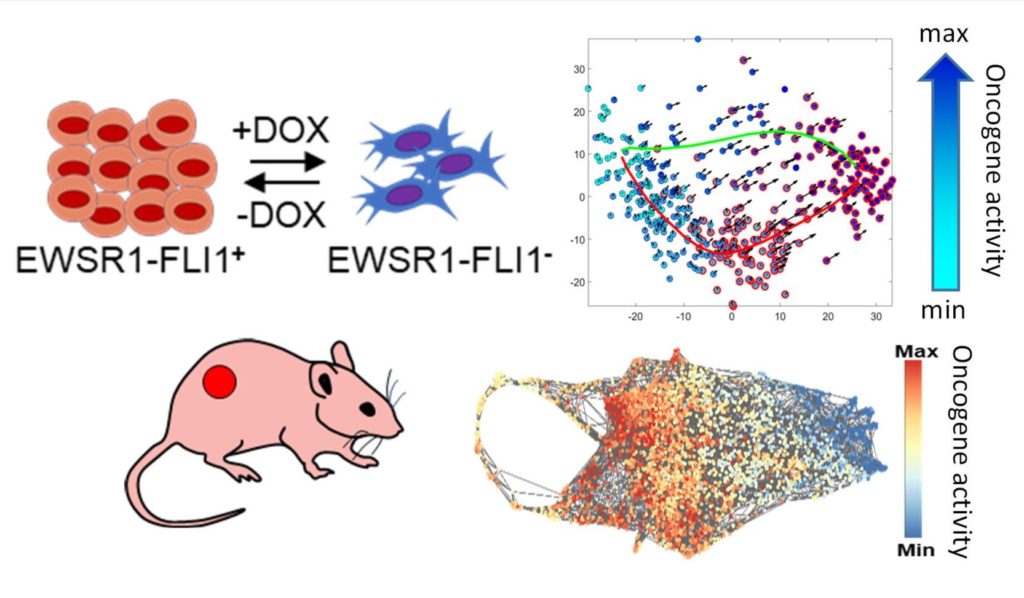
Ewing sarcoma tumors are rare pediatric tumors, located in the bone, with around 70 cases a year in France. The major challenge of their study is to better understand their cellular origins and their heterogeneity.
By following the new “single-cell” approach the researchers can study the intratumoral heterogeneity and identify cellular sub-populations liable to be resistant to treatment. “Identifying these populations can help us better understand the causes of relapses,” explains Andrei Zinovyev, who co-leads the ‘Biology of cancer systems team’, Unit U900, jointly with Emmanuel Barillot, both holding interdisciplinary PRAIRIE chairs. To better characterize intratumoral heterogeneity at the level of individual cells, the researchers studied the properties of multi-dimensional data point clouds representing tumors, using a combination of matrix factorization and penalized regression machine learning approaches.
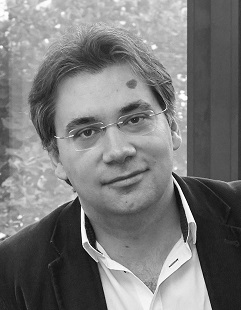
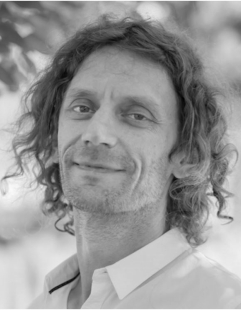
Their work has been published in the international journal Cell Reports: https://www.cell.com/cell-reports/fulltext/S2211-1247(20)30074-7
03.12.2019
Outline proposals are invited for Turing AI World-Leading Researcher Fellowships. Up to £18 million is available to fund a small number of fellows for up to five years starting by 1 April 2021.
The Fellowships are open to top international researchers of all nationalities, and consist of two separate programmes/calls:
Turing AI Acceleration Fellowships (£18 Million) intended to accelerate the careers of high potential researchers towards a world-leading position by the end of their fellowship.
Application deadline: 18 February 2020.
More information: https://www.ukri.org/files/funding/turing-ai-acceleration-fellowship-call-document/
Turing AI World-Leading Researcher Fellowships (£18 Million) focused on building critical mass in the UK.
Application deadline: 2 April 2020.
14.11.2019
Ninon Burgos won the prestigious ERCIM Cor Baayen Young Researcher Award for her work on computational imaging of neurodegenerative diseases.

The award was presented at the end of October in Rome during the European Computer Science Summit (ECSS). The Cor Baayen Young Researcher Award is awarded each year to a promising young researcher in computer science or applied mathematics. It recognises the outstanding scientific quality of research and the impact it has already had on science and society.
Currently working in the ARAMIS Joint Project Team located at the Brain and Spine Institute (Institut du cerveau et de la moelle épinière – ICM), a multidisciplinary laboratory affiliated to several research institutions, including Inria Paris, CNRS, Inserm and Sorbonne Université, Ninon Burgos’ research involves developing computational imaging tools to improve our understanding and diagnosis of dementia.
More information:
https://www.inria.fr/en/centre/paris/news/ninon-burgos-wins-2019-ercim-cor-baayen-young-researcher-award (in English)
https://www.inria.fr/centre/paris/actualites/ninon-burgos-obtient-le-cor-baayen-award-2019 (in French)
12.11.2019
The ALMAnaCH team, which focuses on Natural Language Processing (NLP), has released CamemBERT, a state-of-the-art language model for French.
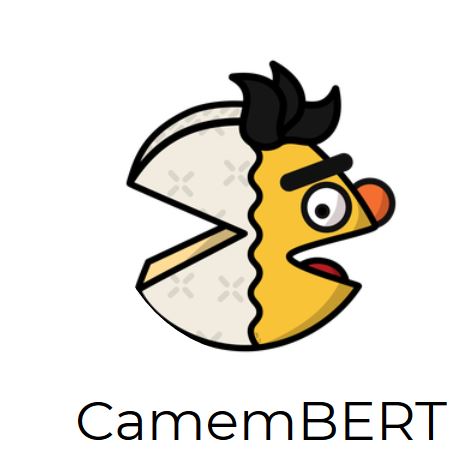
CamemBERT is based on the RoBERTa architecture and has been trained on 138GB of French text. It establishes a new state of the art in part-of-speech (POS) tagging, Dependency Parsing and named entity recognition (NER), and achieves strong results in natural language inference (NLI); improving the state of the art for most tasks over previous monolingual and multilingual approaches, which confirms the effectiveness of large pretrained language models for French.
CamemBERT is the result of a joint work involving Inria and Facebook Research, and was trained and evaluated by Louis Martin, Benjamin Muller, Pedro Javier Ortiz Suárez, Yoann Dupont, Laurent Romary, Éric Villemonte de la Clergerie, Djamé Seddah and Benoît Sagot.
More information: https://camembert-model.fr
03.10.2019
Wednesday 2nd of October saw the launch of PRAIRIE Institute. 21 founding members coming from academia and industry have joined forces to create an Institute for Interdisciplinary Research and Education in AI.
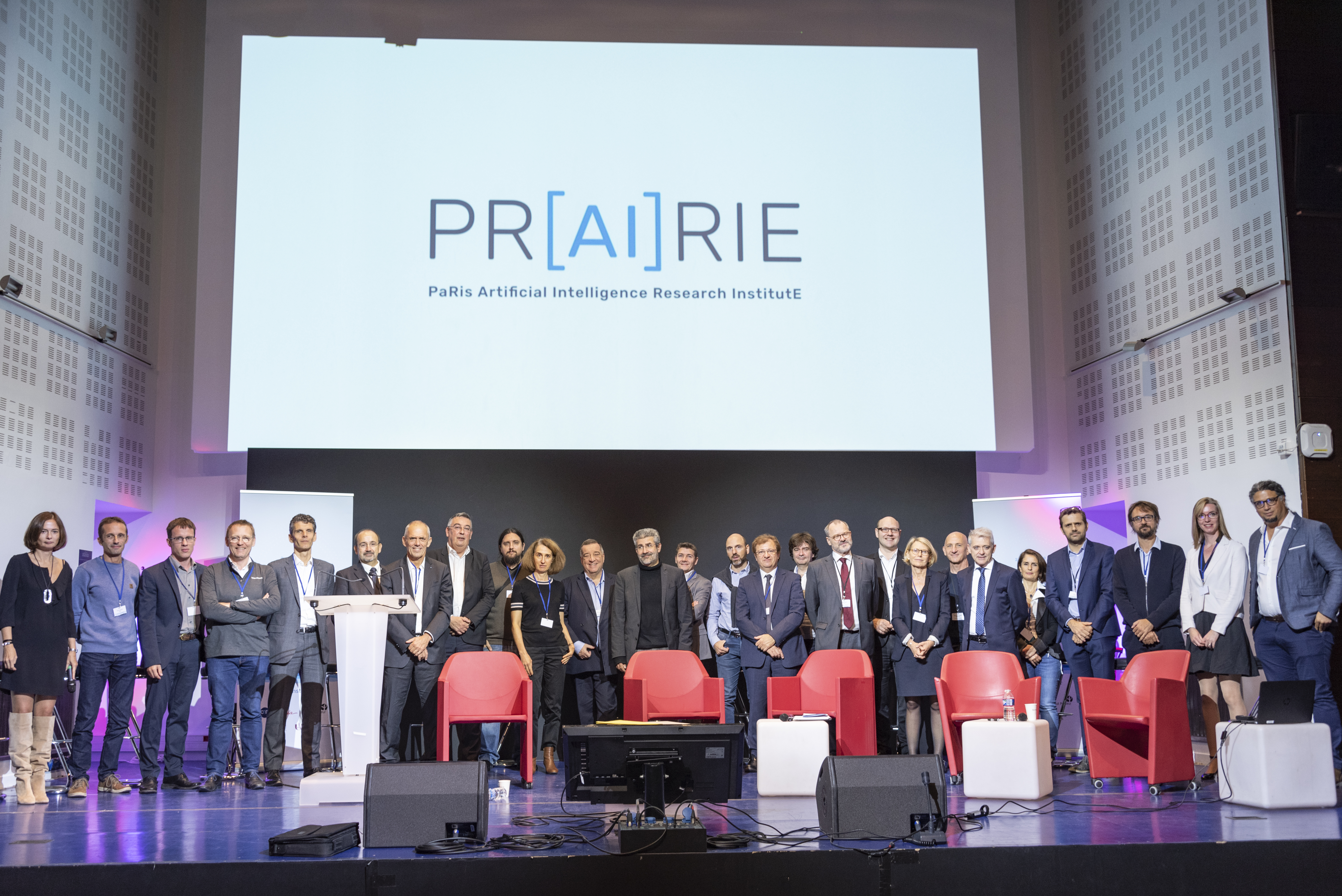
PRAIRIE stands for PaRis Artificial Intelligence Research Institute and its five-year objective is to bring together AI scientific and industrial leaders and become a world leader in AI. The founding members of PRAIRIE are: CNRS, Inria, Institut Pasteur, Université de Paris and Université PSL, together with 16 industrial partners: Amazon, Engie, Facebook, Faurecia, GE Healthcare, Google, IDEMIA, Microsoft, NAVER LABS, Nokia Bell Labs, DeepMind, Pfizer, PSA Group, SUEZ, Uber and Valeo.
Read more about the mission and goals of PRAIRIE.
The launch ceremony, which took place at the Université Paris Dauphine – PSL, gathered over 600 attendees. Take a look at the highlights from the day.